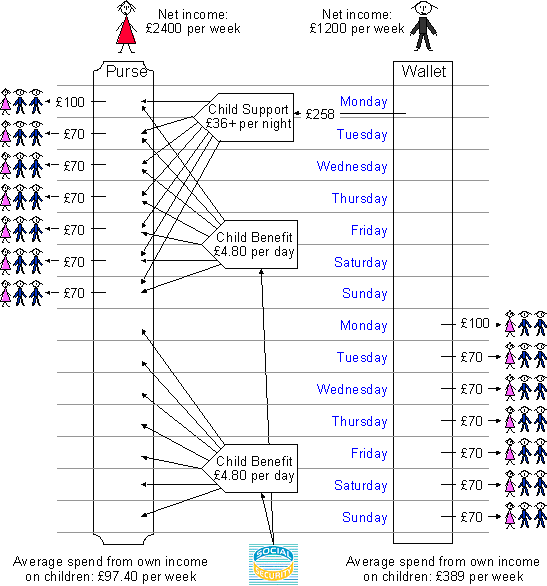Case Study 2
The situation
|
Tony earns £100,000 a year, his wife earns almost double that. She retains the large marital home and Tony lives in a central London flat, where for alternate weeks he looks after the children. Tony believes he cares equally for his children, both financially and emotionally, but the state regards him as a non-resident parent. They spend a total of £520 per week on their 3 children, as shown below. |
The result
Tony is required to pay Cherie £129 per week. If he never saw the children he would pay £258. But he cares for the children 50% of the time, while she earns twice his income and receives all the child benefit. She doesn't have to pay him 12.5% of her income when he cares for the children, so why does he pay her nearly 12.5% of his?
Tony spends an average of £389 out of his earned income per week, comprising this Child Support of £258 one week then the direct spend on their children of £520 the next week on top of this.
Cherie also directly spends £520 each alternate week. However, this is offset by the £258 from Tony for that week and the £33.60 of Child Benefit every week (whoever is caring for the children that week). So she spends an average of less than £98 per week out of her own earnings.
The reasons are:
- Cherie receives the Child Benefit and so she is able to claim Child Support from Tony. Because they care for the children exactly the same amount of time each, this amounts to nearly half of the amount he would pay if he never saw the children (25%)
- Cherie receives all the Child Benefit and Tony receives none of it, even though they care for the children equally and Cherie earns more than Tony.
- Cherie's income is ignored totally for assessing child support.
By far the best solution for high-earners such as these is to remove the anomalies (such as the White Paper's unfair "equal sharing rule") which would encourage someone like Cherie to use the CSA rather than come to a private agreement. Then leave them to sort out their own affairs unless enforcement is needed. The CSA has a hard enough task without being used by people playing games.
This case study is based on:
New system simpler but 'more unfair to fathers'
by Philip Johnston, The Daily Telegraph, 2/7/99.
This is an HTML transcription of an article written in September 1999, hence the benefits rates, the references to the White Paper, etc.
 A marriage is on the rocks. For the sake of argument, the couple's names are Tony and Cherie. They have three children and, after separation, agree to share care of their offspring equally.
A marriage is on the rocks. For the sake of argument, the couple's names are Tony and Cherie. They have three children and, after separation, agree to share care of their offspring equally.